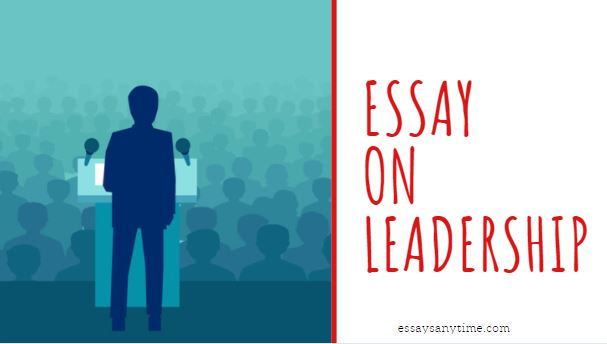500 Word Essay on Leadership
The following is a 500-word essay on leadership-sample written by our expert writers. If you need a similar essay done from scratch by one of our expert writers please do not hesitate to check our essay writing service.
Importance of Leadership and Organizational Productivity
An effective organization is one that is able to find a balance between the demands of the stakeholders and the employees’ needs. Effective leadership is one of the factors that plays a critical role in the direction and orientation of the organization, and thus its effectiveness (Meraku, 2017). The topic of leadership has been extensively researched in the management literature. Hence, the concept has been rendered various definitions based on different aspects of management. According to Barbosa et al. (2017), leadership defines the personality, behaviors, standard of interactions with people, and the influence that an individual exerts on others. Chemers (2014) defines leadership as the process of persuading and guiding others’ behaviors to attain the objectives of an organization. Therefore, without effective leadership, an organization cannot realize any substantial performance or productivity.
Leadership has important implication on the motivation, engagement, and performance of the employees. The goal of effective leadership is to bring workmanship to people, improve quality and performance, and overall organizational effectiveness. Effective leaders create and maintain a work environment and organization culture in which the employees feel accepted, where they can completely engage in advancing the organizational goals. According to Gabčanová (2011), employees are the most important organizational asset. Highly satisfied, motivated, and engaged employees are the foundation a company’s competitive advantage. The level of employee motivation is reflected in the improvement in product quality, improved customer service, and increased organizational productivity (Gabčanová, 2011). Hence, organizational leaders must possess effective leadership skills in order to improve the performance of their employees.
There are various existing leadership styles, nonetheless, the transformational and transactional leadership theories are the most cited in the management literature. Transformational leadership is a type of leadership in which leaders aspire to transform their followers’ behaviors and improve their performance (Barbosa et al., 2017). Transformational leadership has four dimensions: charisma, inspiration, individual consideration, and intellectual stimulation. Transactional leadership is a type of leadership where the leaders and the followers enter into a transaction in order to improve the subordinates’ performance; it is characterized by management by exception and contingent rewards. Compared to transactional leadership style, transformational leadership result in more motivated, engaged and committed employees. Transformational leaders understand their employees, inspire them to improve their performance, simulate creativity and innovation, listen to their ideas, and involve them in decision-making. Involvement of employees in organizational processes plays an important role in improving their motivation, hence, organizational productivity. Transactional leadership style has been found to undermine creativity, morale, innovation, and employee commitment (Barbosa et al., 2017). Thus, in order to positively influence those around them, and reap maximum benefit, it is important for leaders to be attribute themselves to transformational leadership styles.
Effective leaders also play important roles in the establishment of organizational strategies, resource allocation, quality management, supply chain management, and other organizational processes. Hence, whether public or private, leaders directly influence organizational performance because they determine whether the staff will have the motivation to effectively execute the state goals, whether the allocated resources will be used effectively, and whether customers will be willing to remain loyal.
References
Barbosa, F. M., Gambi, L. D. N., & Gerolamo, M. C. (2017). Leadership and quality management–a correlational study between leadership models and quality management principles. Gestão & Produção, 24(3), 438-449. https://doi.org/10.1590/0104-530X2278-16
Chemers, M. (2014). An integrative theory of leadership.
Gabčanová, I. V. E. T. A. (2011). The employees–the most important asset in the organizations. Human Resources Management & Ergonomics, 5(1), 30-33. https://frcatel.fri.uniza.sk/hrme/files/2011/2011_1_03.pdf
Meraku, A. (2017). Role of leadership in organizational effectiveness. Journal of Economics, Business and Management, 5(11), 336-340. https://doi.org/10.18178/joebm.2017.5.11.535
